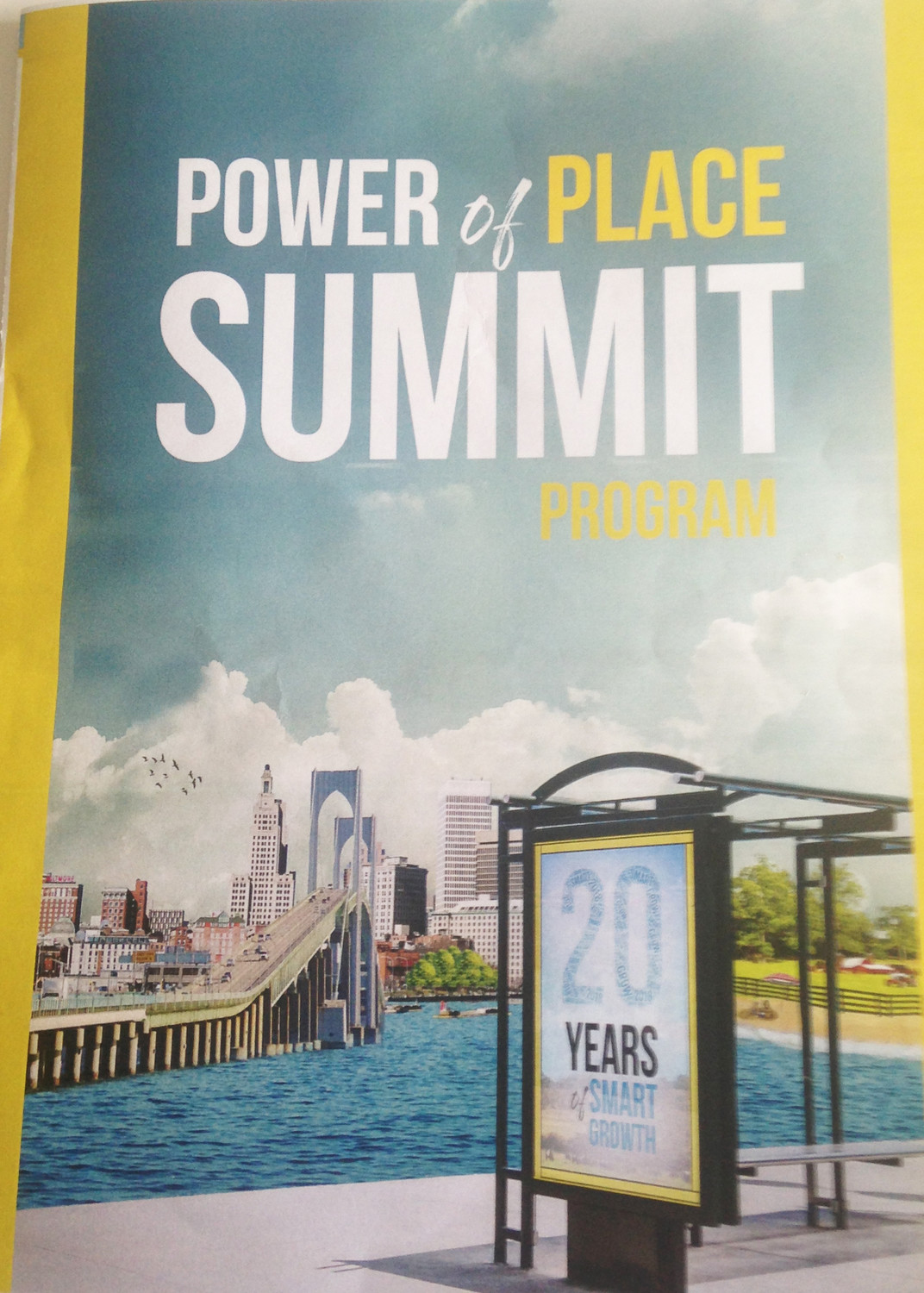What are the limits of smart growth?
The Grow Smart RI 2018 summit, The Power of Place, attempted to leave skeptics in the dust
Part One
PROVIDENCE – Attending the Grow Smart 2018 The Power of Place confab at the R.I. Convention Center on Thursday, March 29, with its more than six dozen corporate and government agency sponsors and hundreds in attendance, ConvergenceRI found it difficult to stay focused on the scripted, positive story line: how 20 years of successful cause-and-effect of smart growth policies in Rhode Island were portrayed as incontrovertible facts in the creation of more vibrant, resilient communities. Too many disruptions in the narrative kept emerging.
The morning session featured correspondent James Fallows, who gave the keynote address, followed by remarks from Gov. Gina Raimondo, followed by a talk by Bob Yaro, who promoted the strategy for “Rebooting New England” through investments in a high performance rail network.
The breakout sessions included topics such as “Unlocking Regional Prosperity through Improved Rail Connectivity,” “The Ballpark at Slater Mill: Looking Back, Looking Ahead,” “Building the Next Generation of Public/Private Partnerships,” “Creating a Model for Resilience: An Update on Newport’s Smart Cities Initiative,” and “A New Crossroads in Housing Choice.”
At first, much as with the onset of the flu, it was difficult for ConvergenceRI to discern exactly what was causing discomfort with the Grow Smart RI messaging.
• Listening to Yaro promote investment in regional high performance rail infrastructure, ConvergenceRI wondered: How often, if ever, had Yaro himself commuted by train from Providence into Boston and back on a daily basis for work? How would that kind of actual workplace commuting experience have changed his perspective?
[For the record, ConvergenceRI had done that commute for more than six years, spread over two decades: driving to Providence, parking, rushing to catch the train, either Amtrak or the MBTA, traveling to South Station, walking to work, then reversing those steps. ConvergenceRI had also commuted to Westborough, Mass., a roundtrip of 130 miles a day, for three years.]
Beyond looking at improving rail connectivity as a smart growth solution, was it equally important to re-envision the future design of the corporate workplace around virtual connectivity, not office buildings?
• Listening as the speakers talked repeatedly about the concept of resiliency, ConvergenceRI kept thinking about the words of Elizabeth Yeampierre, an attorney and activist involved with the Puerto Rican community, who had spoken the week before, on Tuesday, March 20, at the University of Rhode Island campus in Providence.
Yeampierre addressed what had happened on the island in response to Hurricane Maria through the lens of climate change and environmental racism; she took great exception to the use of the word, resiliency.
“We in the movement have a problem with the word resilience,” Yeampierre said, as reported by Tim Faulkner of ecoRI News. “Resilience means you bounce back, it means you go back to where you were before there was an extreme weather event or disaster.”
Yeampierre continued: “What does that mean for people of African and indigenous ancestry to bounce back? Does it mean to bounce back to displacement? To be put in positions [which] are unacceptable and violate basic human rights? Is that what it means in Puerto Rico to bounce back to colonialism?”
Instead, Yeampierre preferred the use of “resistant” to “resilient.” ConvergenceRI wondered: How would Yeampierre’s talk have been received at the 2018 Power of Place Summit? Good question.
Leaving skeptics in the dust
The inclusive mission of Grow Smart RI, as stated in the program, was to convene broad coalitions and provide statewide leadership, advocacy and dedication to build communities where all people and businesses can thrive.
The statement of purpose for the 2018 Power of Place Summit in the program appeared to be more about cheerleading than cause and effect.
“Together, we can leave the skeptics in the dust and accelerate and expand Rhode Island’s emerging comeback,” Scott Wolf, the executive director of Grow Smart RI, had written in his introduction in the event’s program, celebrating what it called “20 years of smart growth.”
In his vision of Rhode Island’s future, “Accelerating and expanding our revitalization momentum,” Wolf wrote: “Our economy is stronger, cranes are once again on the downtown skyline, our quality of place and local food scene are the subject of numerous magazine articles and new companies are choosing our state as a place to locate, develop talent and grow.”
Wolf continued: “We believe that there is still vast untapped potential for Rhode Island economically and socially and little room for error in making further progress while retaining our outstanding but fragile urban rural balance.”
Further, Wolf wrote: “Although the ‘knee-jerk negativity’ that has hobbled Rhode Island for far too long is abating, it is still far too pervasive and threatens sound public-private partnerships for additional investments in infrastructure enhancement, workforce housing, historic rehab, and upgrades to our commuter rail and bus systems.”
Who could argue with – or ask questions about – that kind of powerful sermon, preaching optimism and collaboration and public-private partnerships while at the same time bashing “knee-jerk negativity?” Good question.
Did this paean of praise sound as if it could have been written by CommerceRI and published on the economic development agency’s website? Good question.
A more fundamental question, perhaps, is how smart growth is being defined: Is it embodied by the proposed 46-story residential tower, which would become the tallest building in Providence, a skyscraper to be known as Hope Point Tower? The 195 Redevelopment District Commission approved a purchase and sales agreement for the land with New York developer Jason Fane at its March 29 meeting, the same day as the summit.
Is it embodied by the Wexford Innovation Complex now under construction on the former 195 land? Two days before the summit, on Tuesday, March 27, the last steel beam had been put in place in the steel structure for the Wexford Innovation Complex, in a ceremony marked by numerous elected officials.






